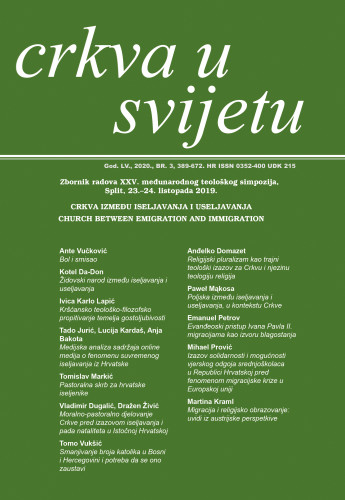Sve prisutniji kulturalni i religijski pluralizam neminovno postavlja pitanje odnosa kršćana prema rastućoj religioznoj pluralizaciji društva u kojem žive. U ovom tekstu pokušava se ukazati na teoretski i praktični doprinos koji teološka refleksija može dati kako bi se izazov religijskog pluralizma mogao vidjeti u ispravnom svjetlu tako da iz teoloških razmišljanja može slijediti konkretna politička i religijska praksa u društvu. Polazeći od činjenice da kršćani svagdje u svijetu žive u svakodnevnom egzistencijalnom kontaktu sa sljedbenicima drugih religija, Katolička Crkva, počevši od Drugoga vatikanskog koncila, intenzivno raspravlja o teološkom vrjednovanju fenomena religijskog pluralizma i samoshvaćanju kršćanstva naočigled religijske povijesti čovječanstva. Budući da je religijski pluralizam objektivni teološki problem, u prvom dijelu rada autor analizira tri uobičajena religijsko-teološka nacrta ili modela koje nudi današnja teologija religija u pokušaju da odgovori na pitanje kakav bi trebao biti stav Crkve i kršćana prema religijskom pluralizmu: pretkoncilsko stajalište prema drugim religijama (ekskluzivistički ekleziocentrizam), pristup Drugoga vatikanskog koncila i poslijekoncilske teologije (inkluzivistički kristocentrizam) te pogled na druge religije predstavnika takozvane pluralističke teologije religija (pluralistički teocentrizam). U kontekstu religijskog pluralizma Crkva je kao zajednica vjernika pozvana potvrđivati vlastiti kršćanski identitet u dijalogu s postojećim religijama i kulturama u kojima kršćani žive. Stoga se u drugom dijelu rada, osim opisane trostruke klasifikacije pristupa teologiji religija, sažeto predstavljaju religijsko-teološki nacrti dvojice njemačkih katoličkih teologa.; Progressingly present cultural and religious pluralism inevitably raises the question of the attitude of Christians towards the growing religious pluralization of the society in which they live. This text tries to point out the theoretical and practical contribution that theological reflection can offer so that the challenge of religious pluralism can be seen in the right light and so that concrete political and religious practice in society could follow from theological reflections. Starting from the fact that Christians everywhere in the world live in daily existential contact with followers of other religions, the Catholic Church, starting from the Second Vatican Council, intensively discusses the theological evaluation of the phenomenon of religious pluralism and self-understanding of Christianity in the face of religious history of mankind. Considering the fact that religious pluralism is an objective theological problem, in the first part the author analyzes three common religious-theological drafts or models offered by today's theology of religions trying to answer the question of what should be the attitude of the Church and Christians towards religious pluralism: pre-Council attitude towards other religions (exclusivist ecclesiocentrism), the approach of the Second Vatican Council and post-Council theology (inclusivist Christocentrism) and a view of other religions of the representatives of the so-called pluralistic theology of religions (pluralistic theocentrism). In the context of religious pluralism, the Church, as a community of believers, is called to affirm its own Christian identity in dialogue with the existing religions and cultures in which Christians live. Therefore, in the second part of the paper, aside from the described triple classification of approaches to the theology of religions, the religious-theological plans of two German Catholic theologians are summarized.
Sažetak

 Crkva u svijetu : 55,3(2020) / glavni i odgovorni urednik, editor-in-chief Mladen Parlov.
Crkva u svijetu : 55,3(2020) / glavni i odgovorni urednik, editor-in-chief Mladen Parlov.